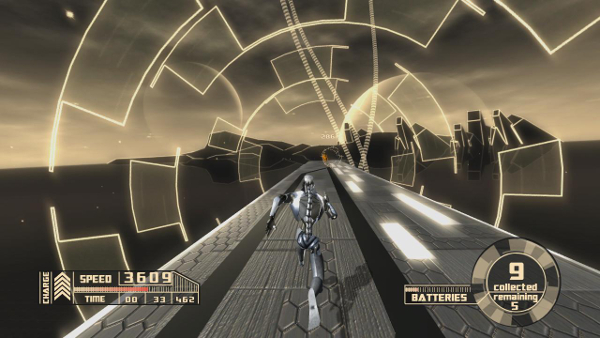
The Game: T.E.C. 3001 (2011)
Developer: Phoenix Game Studio (Official Site)
Publisher: Phoenix Game Studio
System: Xbox 360 (Indie Games)
The Premise: You are the Tesla Energy Collector, a robot tasked with recovering fragments of energy from the virtual world to aid the remnants of humanity. This is accomplished via running very fast.
Is It Any Good?: Listen, who doesn’t like running? Nearly everyone, that’s who (or whom, I’m not entirely sure). Running is awful. You sweat, you get tired, your feet hurt. Even when dressed up in the trappings of more entertaining activities (Ultimate Frisbee, tag, bear fleeing) the act of running is a crushing, joyless experience for your average desk jockey. But the idea of running, now that’s another matter entirely. Games have long been about briefly liberating players from the drudgery of reality and transporting them to a magical realm where they can be literally anything, from the slayer of alien hordes, to a Superbowl winning QB, to an inter-regional small freight commercial truck driver. So it’s little wonder that the visceral appeal of physical speed has historically been a strong selling point for games.
T.E.C. 3001 takes that running concept and strips it down to a few key components. Momentum is perpetual, influenced solely by acceleration pads you pass over, so you’re constantly moving from one end of the level to the other. There’s a handful of action modifiers (double jump, dash, slide), but the majority of the challenge comes from knowing the path and split-second timing. The game makes smart use of its third dimension, giving you just enough freedom of movement to make it a key-part of your forward progress, but limiting your route so you’re never at a loss as to where to go. In addition to avoiding obstacles, you’re also tasked with collecting a set number of batteries laid out along each track. Thankfully this tends to be more of a score-modifier than an actual challenge, as I rarely finished a level with less than the required allotment. Mechanically the closest analogy is probably the side-scrolling Bit.Trip Runner, and as in that game, a perfect run can often take less than a minute. And if you do finish the game in less than 30 minutes, congratulations; you’re obviously some sort of video game savant, and will be receiving a call from the Rylan Star League shortly.

For everyone else, expect dozens of retries once you get past the first few levels. Responsive controls, near-instantaneous restarts and a checkpoint system for the longer runs helps take the sting out, and only rarely did I feel that the game “cheated” me out of a run, either by hanging me up on a piece of geometry or failing to register what I thought was a clean landing. As with a Super Meat Boy or Hotline Miami, death isn’t so much a punishment as a learning tool, and as you master the game’s limited mechanics there’s a deep satisfaction in watching your skills grow. I also liked that the game gives you a degree of leeway with certain obstacles and abilities, particularly the double jump + dash, so you can occasionally fudge your way past a particularly difficult section (usually with a trade-off in speed/battery score). Combined with multiple paths through most levels, it’s a nice balance between facilitating progress and encouraging replay.
At this point I should probably talk about T.E.C. 3001’s story. There isn’t one. What the game does have is a solid aesthetic that feels like the lovechild of Tron and Rez. Between your metallic character, the metal and neon structures and the trippy line-work backgrounds, the game does a great job of crafting a visually impressive world-space with what I had to imagine was the budget for most developers’ snacks. It’s not Far Cry 3 pretty, but it smartly employs the indie mantra of style over polygons. I also liked the small touch of having gates which change the primary color of the level. A small thing, but it adds a welcome visual variety to each section, much appreciated when you’re on attempt #478.
More importantly however, the game nails the all-important sense of speed. The robot actually starts most levels at barely more than a fast jog, but as you pick up speed there’s such a smooth transition as you increase pace that by the time you reach an all-out sprint, you actually feel like you’re going fast. Really fast. It’s a difficult thing to articulate, but at the risk of kicking a hedgehog while it’s down, anyone who’s played a modern 3D Sonic can tell you there’s a difference between a game’s speed, and the character’s actual sense of motion. Through a careful mixture of animation and camera placement T.E.C. 3001 makes it feel like your character actually is, if you’ll allow me to use a technical running term, haulin’ ass. It’s ultimately the crux of the game’s appeal, that sense of threading the needle while always at the brink of losing control.

Finding a fun game in the toxic sludge of the Xbox Indie Market is rare in and of itself, but finding one that tackles a notoriously difficult niche genre with aplomb? That’s something special. The great thing about the Xbox Indie Marketplace is that every game comes with a trial version, so if $3 worth of Microsoft Spacebucks is a bit rich for your blood, you can try before you buy.
Bonus Points: Hey, you guys are cool right? You seem pretty cool. I’m only asking because all the cools kids are over on Steam Greenlight, upvoting T.E.C. 3001so we can all play it on our fancy computin’ machines. It’s the best kind of support for an indie game: the free kind!
MOAR LIKE THIS PLZ: Bit.Trip Runner, Mirror’s Edge, Temple Run, Sonic 22: Eggman Boogaloo
Follow me on Twitter
